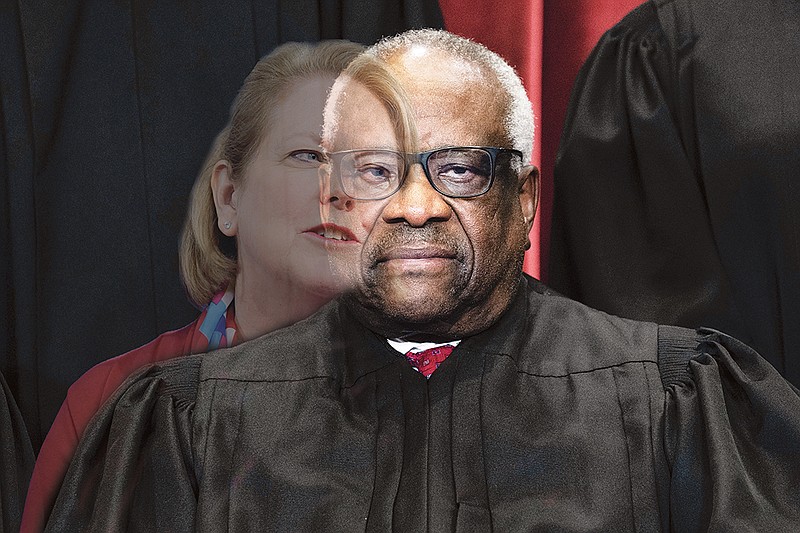Federal law requires Supreme Court justices to recuse themselves from cases in which their "impartiality might reasonably be questioned." Unlike other judges, however, Supreme Court justices decide themselves whether their impartiality is up for questioning.
This "just trust me" approach poses obvious ethical problems. Look no further than Associate Justice Clarence Thomas and his wife, Virginia "Ginni" Thomas.
Ginni has a long history of far-right activism. She has not only called to overturn President Joe Biden's election but she also claimed that the United States is under existential threat from "transsexual fascists" and the "deep state."
It is her First Amendment right to hold these views, however cartoonish. But her deep ties in Washington could land her right in the middle of issues Justice Thomas is supposed to judge impartially - especially the Jan. 6 coup attempt.
According to newly revealed documents, Ginni Thomas sent at least 21 text messages to Mark Meadows, then-President Donald Trump's chief of staff, between the 2020 presidential election and the violent Capitol insurrection.
In these messages, she called Biden's win "the greatest Heist of our History" and urged Trump not to concede. She also claimed she was communicating with "Jared," presumably Trump's son-in-law, Jared Kushner.
On Jan. 6, Ginni Thomas attended the "Stop the Steal" rally that preceded the insurrection, although she denies playing a role in the storming of the Capitol.
The congressional committee that's investigating the Jan. 6 insurrection is looking into Ginni Thomas' text messages and may call her to testify. Cases related to the investigation could potentially reach the Supreme Court - and Justice Thomas.
One Jan. 6 case has already come before the Supreme Court. Justice Thomas didn't recuse himself. Instead, he cast the sole vote favoring Trump's attempt to block records that could prove damaging to his wife or him.
There are between 150 and 200 cases per year in which justices recuse themselves. Yet Justice Thomas' own history of recusals is thin - and he's never recused himself when his wife has known political connections to the case.
That's a huge conflict, since Mrs. Thomas holds powerful positions in many far-right organizations. Until recently, the website for her Liberty Consulting Group boasted that she could "give access to any door in Washington."
According to a New Yorker investigation, Mrs. Thomas is one of the directors of the Center for National Policy, a dark-money outfit that plays matchmaker for big donors and far-right activists. She's a co-founder of the far-right activist group Groundswell. And she's consulted with countless conservative organizations.
Members of these organizations have had several cases before the high court, The New Yorker reports. For instance, Frank Gaffney of the Center for Security Policy - where Ginni Thomas was a paid consultant - filed an amicus brief in favor of the Trump administration's "Muslim Ban."
Justice Thomas didn't recuse himself from ruling on that case. Nor did he recuse himself when other groups Ginni Thomas collected income from challenged the Affordable Care Act.
Legal experts say Ginni Thomas' political work is, at best, very damaging to the appearance of impartiality for her husband. At worst, some say it is even cause for his impeachment.
Whatever else, respected judicial ethicist Stephen Gillers states plainly, "Clarence Thomas cannot sit on any matter involving the election, the invasion of the Capitol, or the work of the January 6 Committee."
It isn't just Clarence Thomas' reputation that's at risk. It's the entire Supreme Court's.
Public approval of the court has fallen to its lowest point in more than 20 years. Justice Sonia Sotomayor blames the "stench of partisanship," while Chief Justice John Roberts worries that "the role of the Supreme Court in our constitutional system" is at stake.
Our democracy is supposed to rely on the consent of the governed, so even the appearance of partisanship at the nation's highest constitutional court puts its legitimacy at risk.
Democrats on Capitol Hill have proposed legislation to impose a code of ethics on the Supreme Court for years. If Justice Thomas can't be moved by personal ethics or his colleagues' concerns to act appropriately, then lawmakers should settle the matter for him.
Karen Dolan is a fellow of the Institute for Policy Studies. She wrote this for InsideSources.com.
Tribune Content Agency
